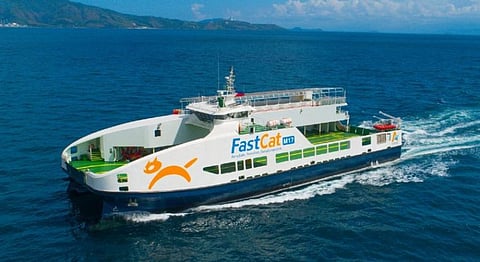

Our old friends the Pastrana family have revolutionised the Ro-Pax ferry sector in the once notoriously dangerous Philippines. They have developed a fleet of safe, comfortable, reliable, well-maintained, competently crewed, attractive and efficient vessels. In doing so, they have stirred-up and inspired their competitors and made a massive contribution to the improvement in the safety and quality of ferry travel in their country.
Two of their company's newest vessels are simply developments and refinements of their earlier ships and, in a dramatic change from the earlier steel-hulled models, are now built entirely of aluminium. They are magnificent ferries and, as with all in the Archipelago Philippine Ferries Corporation (APFC) fleet, will stand out distinctively from their competitors.
"The new ferries stand out for improved onboard comfort with accommodation spaces featuring an enhanced seating design and layout and a centralised air conditioning system that is also environment-friendly," Christopher Pastrana, President of APFC, told Baird Maritime. "Their engines are also more efficient and compliant to emission standards. Navigational and safety equipment have also been upgraded with the latest available machinery and instruments."
Pastrana remarked that the difficulty in the development of the ferries lay mainly in the documentation aspect, as the vessels were built overseas. The processing of importation documents and tax exemptions and securing of domestic licenses impacted the otherwise timely deployment of the vessels. The Covid-19 pandemic and the lockdowns and travel restrictions it brought about also affected company's operations, but the industry nonetheless continued to provide opportunities for the operator.
"As the Philippines is an archipelagic country, shipping remains the backbone of the transportation industry and so it played a very important role in transporting agricultural products, fast-moving consumer goods, essential products, and even locally stranded individuals. Our vessels continued to serve the different islands nationwide during the pandemic, albeit much less frequently compared to before."
APFC therefore had to do what is necessary to continue providing this essential service and so the company worked closely with its employees, local government units, traders, suppliers, and banks to allow it to fulfil its obligations.
"I believe Covid changed the dynamics and demands of shipping services," added Pastrana, "and we have to adapt and make sure our workers and clients are protected. Operators have complied with policies and regulations imposed by the government to ensure business continuity and survival, but we at FastCat will continue to bring more brand new internationally-classed, mid-speed Ro-Pax catamarans as part our commitment to economic development."
Pastrana said APFC saw improvement in cargo traffic volumes but limited passenger movement in 2021. There was a steady increase in cargo movement throughout the Philippines but certain areas have not yet returned to pre-pandemic traffic levels. Still, the company is optimistic that its having survived the worst of the pandemic will enable it to better serve domestic shipping needs once the country's economy starts to recover.
"We believe that tourism will continue to drive and help economic recovery globally," Pastrana told Baird Maritime, citing pre-pandemic domestic tourism figures estimated at 45 million people. "We also hope that foreign tourists will eventually contribute to the Philippines' economic recovery.
